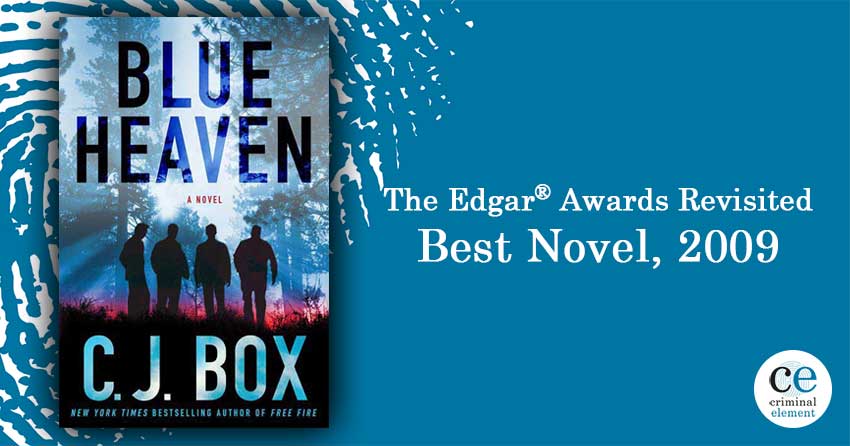The Edgar Awards Revisited: Blue Heaven (Best Novel, 2009)
By Anthony Franze
January 24, 2020It wouldn’t be a C. J. Box novel without a vividly drawn, sprawling setting.

There’s something magical about finding a novel someone left behind at a summer beach house—the idea that people who will likely never cross paths sharing something meaningful, a great book, in the temporary break from their lives. That was how I came across my first C. J. Box novel, Blue Heaven.
Re-reading the novel ten years later, I have to say it holds up. More than holds up, actually. Published before Gone Girl and the tidal wave of unreliable narrators and big-twist psychological thrillers that are now mainstays, Blue Heaven is a straight-up, old-fashioned thriller. And I mean that in the best possible way.
The story has all the classic elements: a great opening, a straightforward plot, a compelling hero and supporting cast, and a picturesque setting.
Like the best novels, it grabs with its opening line: “If twelve-year-old Annie Taylor had not chosen to take her little brother William fishing on that particular Friday afternoon in April during the wet North Idaho spring, she never would have seen the execution or looked straight into the eyes of the executioners.”
The reader is then thrust into the heart of the plot: The “executioners” turn out to be retired LAPD cops—men with a big secret—who just killed one of their own. After being spotted by the killers, Annie and William make their escape through the woods and go on the run. When their mother reports the kids missing, the bumbling local sheriff delegates the task of finding Annie and William to respected former police officers—the very executioners who want them dead.
The children take refuge in the barn of a nearby ranch. That’s where they meet Jess Rawlins, a down-on-his-luck rancher and the heart of the book. Rawlins is sixty-three years old, divorced, estranged from his adult son who has mental health issues, and about to lose his ranch to the bank. He’s a throwback, struggling to live up to his family name, trying to find his place in a world that is leaving him behind. One of the joys of the novel is watching—and rooting for—Rawlins find peace through the bonds he develops with Annie and William, and their mother—a woman who has a reputation about town and a hidden connection to Rawlins’s family.
The book is also filled with fascinating secondary characters, including fish-out-of-water Eduardo Villatoro, a former L.A. cop who is visiting town chasing leads on a cold case that relates to the retired officers who are hunting for Annie and William. Others include a busybody postal carrier (perfectly named, Fiona Pritzle), a local banker seeking redemption for his shady dealings with the retired cops, and the very real—and very scary—four officers who are out to kill Annie, William, and anyone else who might stumble onto their secret.
Of course, it wouldn’t be a C. J. Box novel without a vividly drawn, sprawling setting. Box took his inspiration from a real place nicknamed “Blue Heaven” that had become a haven for retired cops. He paints a beautiful portrait of a community in transition, “a new population and culture superimposing itself over another.”
After finding Blue Heaven that summer day, I moved on to all of Box’s work, including his Joe Pickett series, and there’s a reason he’s a stalwart on the bestseller list with ten million copies in print. You’re in good company with any of his books.
But if you’re looking for a breath of fresh air—a classic thriller that is light on psychological deception but heavy on heart and good old-fashioned storytelling—you should revisit Blue Heaven. And after you do, leave it somewhere for someone to find…
Notes from the 2009 Edgar Awards:
- The other nominees were Lisa Lutz (Curse of the Spellmans), Karin Alvtegen (Missing), Robert Ferrigno (Sins of the Assassin), Morag Joss (The Night Following), and Declan Hughes (The Price of Blood).
- The award for Best First Novel went to France Lin for The Foreigner. The other nominees were A Cure for Night by Justin Peacock, Calumet City by Charlie Newton, Sweetsmoke by David Fuller, and The Kind One by Tom Epperson.
- Martin McDonagh’s dark yet hilarious In Bruges won Best Motion Picture, edging out Burn After Reading, Tell No One, The Bank Job, and Transsiberian.
- Meg Gardiner’s China Lake won Best Paperback Original.
- John Greene’s Paper Towns won Best Young Adult.
- Sue Grafton and James Lee Burke co-hosted the awards, both serving as Grand Master.
- The Mary Higgins Clark Award was given to The Killer’s Wife by Bill Floyd.
We’ll see everyone back here next week as Adam Wagner returns to review The Last Child by John Hart, the 2010 Edgar Award winner of Best Novel. See you then!
A special thanks goes out to The Mysterious Bookshop for donating many of the review copies of the award-winning books. For the latest on all new releases, as well as classic books for your collections, make sure to sign up for their newsletter.
Comments are closed.

This book sounds so good! Can’t wait to read it.
Getting excited about Criminal Element and their recommended book “Blue Heaven” by C.J. Box. I may have discovered a new favorite author!